- Home
- Nora Roberts
Holiday Wishes Page 2
Holiday Wishes Read online
Page 2
Sun bounced off the mounds of snow. He adjusted his dark glasses and slowed down, then on impulse, stopped. When he stepped from the car, his breath came in streams of smoke. His skin tingled with the cold but he didn’t button his coat or reach in his pockets for his gloves. He needed to feel it. Breathing in the thin, icy air was like breathing in thousands of tiny needles. Jason walked the few feet to the top of the ridge and looked down on Quiet Valley.
He’d been born there, raised there. He’d learned of grief there—and he’d fallen in love. Even from the distance he could see her house—her parents’ house, Jason reminded himself, and felt the old, familiar surge of fury. She’d be living somewhere else now, with her husband, with her children.
When he discovered that his hands were balled into fists, he carefully relaxed them. Channeling emotion was a skill he’d turned into an art over the past decade. If he could do it in his work, reporting on famine, war, and suffering, he could do it for himself. His feelings for Faith had been a boy’s feelings. He was a man now, and she, like Quiet Valley, was only part of his childhood. He’d traveled more than five thousand miles just to prove it. Turning away, he got back in the car and started down the mountain.
From the distance, Quiet Valley had looked like a Currier & Ives painting, all white and snug between mountain and forest. As he drew closer, it became less idyllic and more approachable. The tired paint showed here and there on some of the outlying houses. Fences bowed under snow. He saw a few new houses in what had once been open fields. Change. He reminded himself he’d expected it.
Smoke puffed out of chimneys. Dogs and children raced in the snow. A check of his watch showed him it was half past three. School was out, and he’d been traveling for fifteen hours. The smart thing to do was to see if the Valley Inn was still in operation and get a room. A smile played around his mouth as he wondered if old Mr. Beantree still ran the place. He couldn’t count the times Beantree had told him he’d never amount to anything but trouble. He had a Pulitzer and an Overseas Press Award to prove differently.
Houses were grouped closer together now, and he recognized them. The Bedford place, Tim Hawkin’s house, the Widow Marchant’s. He slowed again as he passed the widow’s tidy blue clapboard. She hadn’t changed the color, he noticed, and felt foolishly pleased. And the old spruce in the front yard was already covered with bright red ribbons. She’d been kind to him. Jason hadn’t forgotten how she had fixed hot chocolate and listened to him for hours when he’d told her of the travels he wanted to make, the places he dreamed of seeing. She’d been in her seventies when he’d left, but of tough New England stock. He thought he might still find her in her kitchen, patiently fueling the wood stove and listening to her Rachmaninoff.
The streets of the town were clear and tidy. New Englanders were a practical lot, and, Jason thought, as sturdy as the bedrock they’d planted themselves on. The town had not changed as he’d anticipated. Railings Hardware still sat on the corner off Main, and the post office still occupied a brick building no bigger than a garage. The same red garland was strung from lamppost to lamppost as it had been all through his youth during each holiday season. Children were building a snowman in front of the Litner place. But whose children? Jason wondered. He scanned the red mufflers and bright boots, knowing any of them might be Faith’s. The fury came back and he looked away.
The sign on the Valley Inn had been repainted, but nothing else about the three-story square stone building was different. The walkway had been scraped clean and smoke billowed out of both chimneys. He found himself driving beyond it. There was something else to do first, something he’d already known he would have to do. He could have turned at the corner, driven a block and seen the house where he grew up. But he didn’t.
Near the end of Main would be a tidy white house, bigger than most of the others, with two big bay windows and a wide front porch. Tom Monroe had brought his bride there. A reporter of Jason’s caliber knew how to ferret out such information. Perhaps Faith had put up the lace curtains she’d always wanted at the windows. Tom would have bought her the pretty china tea sets she’d longed for. He’d have given her exactly what she’d wanted. Jason would have given her a suitcase and a motel room in countless cities. She’d made her choice.
After ten years he discovered it was no easier to accept. Still, he forced himself to be calm as he pulled up to the curb. He and Faith had been friends once, lovers briefly. He’d had other lovers since, and she had a husband. But he could still remember her as she’d looked at eighteen, lovely, soft, eager. She had wanted to go with him, but he wouldn’t let her. She had promised to wait, but she hadn’t. He took a deep breath as he climbed from the car.
The house was lovely. In the big bay window that faced the street was a Christmas tree, cluttered and green in the daylight. At night it would glitter like magic. He could be sure of it because Faith had always believed so strongly in magic.
Standing on the sidewalk, he found himself dealing with fear. He’d covered wars and interviewed terrorists but he’d never felt the stomach-churning fear that he did now, standing on a narrow snow-brushed sidewalk facing a pristine white house with holly bushes by the door. He could turn around, he reminded himself. Drive back to the inn or simply out of town again. There was no need to see her again. She was out of his life. Then he saw the lace curtains at the window and the old resentment stirred, every bit as strong as fear.
As he started down the walk, a girl raced around the side of the house just ahead of a well-aimed snowball. She dived, rolled and evaded. In an instant, she was up again and hurling one of her own.
“Bull’s-eye, Jimmy Harding!” With a whoop, she turned to run and barreled into Jason. “Sorry.” With snow covering her from head to foot, she looked up and grinned. Jason felt the world spin backward.
She was the image of her mother. The sable hair peeked out of her cap and fell untidily to her shoulders. The small, triangular face was dominated by big blue eyes that seemed to hold jokes all of their own. But it was the smile, the one that said, Isn’t this fun? that caught him by the throat. Shaken, he stepped back while the girl dusted herself off and studied him.
“I’ve never seen you before.”
He slipped his hands into his pockets. But I’ve seen you, he thought. “No. Do you live here?”
“Yeah, but the shop’s around the side.” A snowball landed with a plop at her feet. She lifted a brow in a sophisticated manner. “That’s Jimmy,” she said in the tone of a woman barely tolerating a suitor. “His aim’s lousy. The shop’s around the side,” she repeated as she bent to ball more snow. “Just walk right in.”
She raced off, holding a ball in each hand. Jason figured Jimmy was in for a surprise.
Faith’s daughter. He hadn’t asked her name and nearly called her back. It didn’t matter, he told himself. He’d only be in town a few days before he took the next assignment. Just passing through, he thought. Just cleaning the slate.
He backtracked to walk around the side of the house. Though he couldn’t imagine what sort of shop Tom could have, he thought it might be best to see him first. He almost relished it.
The little workshop he’d half expected turned out to be a miniature of a Victorian cottage. The sleigh out in front held two life-size dolls dressed in top hats and bonnets, cloaks and top boots. Above the door was a fancy hand-painted sign that read Doll House. To the accompaniment of bells, Jason pushed the door open.
“I’ll be right with you.”
Hearing her voice again was like stepping back and finding no solid ground. But he’d deal with it, Jason told himself. He’d deal with it because he had to. Slipping off his glasses, he tucked them into his pocket and looked around.
Child-size furniture was set around the room in the manner of a cozy parlor. Dolls of every shape and size and style occupied chairs, stools, shelves and cabinets. In front of an elf-size fire
place, where flames shimmered, sat a grandmother of a doll in lace cap and apron. The illusion was so strong, Jason almost expected her to begin rocking.
“I’m sorry to keep you waiting.” With a china doll in one hand and a bridal veil in the other, Faith walked through the doorway. “I was right in the middle of . . .” The veil floated out of her hand as she stopped. It waltzed to the floor with no sound at all. Color rushed away from her face, making the deep-blue eyes nearly violet in contrast. In reaction, or defense, she gripped the doll to her breast. “Jason.”
Chapter 2
Framed in the doorway, with the thin winter light creeping through the tiny windows, she was lovelier than his memory of her. He’d hoped it would be different. He’d hoped his fantasies of her would be exaggerated, as so many fantasies are. But she was here, flesh and blood, and so beautiful she took his breath away. Perhaps because of it, his smile was cynical and his voice cool.
“Hello, Faith.”
She couldn’t move, forward or back. He trapped her now as he had so many years before. He didn’t know it then; she couldn’t let him know it now. Emotion, locked and kept secret for so long, struggled against will and was held back. “How are you?” she managed to ask, her hands like a vise around the doll.
“Fine.” He walked toward her. God, how it pleased him to see the nerves jumping in her eyes. God, how it tormented him to learn she smelled the same. Soft, young, innocent. “You look wonderful.” He said it carelessly, like a yawn.
“You were the last person I expected to see walk through the door.” One she’d learned to stop looking for. Determined to control herself, Faith loosened her grip on the doll. “How long are you in town?”
“Just a few days. I had the urge.”
She laughed and hoped it didn’t sound hysterical. “You always did. We read a lot about you. You’ve been able to see all the places you always wanted to see.”
“And more.”
She turned away, giving herself a moment to close her eyes and pull her emotions together. “They ran it on the front page when you won the Pulitzer. Mr. Beantree strutted around as though he’d been your mentor. ‘Fine boy, Jason Law,’ he said. ‘Always knew he’d amount to something.’”
“I saw your daughter.”
That was the biggest fear, the biggest hope, the dream she’d put to rest years ago. She bent casually to pick up the veil. “Clara?”
“Just outside. She was about to mow down some boy named Jimmy.”
“Yes, that’s Clara.” The smile came quickly and just as stunningly as it had on the child. “She’s a vicious competitor,” she added, and wanted to say like her father, but didn’t dare.
There was so much to say, so much that couldn’t be said. If he had had one wish at that moment it would have been to reach out and touch her. Just to touch her once and remember the way it had been.
“I see you have your lace curtains.”
Regret washed over her. She’d have settled for bare windows, blank walls. “Yes, I have my lace curtains and you have your adventures.”
“And this place.” He turned to look around again. “When did all this start?”
She could deal with it, she promised herself, this hatefully casual small talk. “I opened it nearly eight years ago now.”
He picked a rag doll from a bassinet. “So you sell dolls. A hobby?”
Something else came into her eyes now. Strength. “No, it’s my business. I sell them, repair them, even make them.”
“Business?” He set the doll down and the smile he gave her had nothing to do with humor. “It’s hard for me to picture Tom approving of his wife setting up a business.”
“Is it?” It hurt, but she set the china doll on a counter and began to arrange the veil on its head. “You always were perceptive, Jason, but you’ve been away a long time.” She looked over her shoulder and her eyes weren’t nervous or even strong. They were simply cold. “A very long time. Tom and I were divorced eight years ago. The last time I heard, he was living in Los Angeles. You see, he didn’t care for small towns either. Or small-town girls.”
He couldn’t name the things that stirred in him so he pushed them aside. Bitterness was simpler. “Apparently you picked badly, Faith.”
She laughed again but the veil crumpled in her hand. “Apparently I did.”
“You didn’t wait.” It was out before he could stop it. He hated himself for it, and her.
“You were gone.” She turned back slowly and folded her hands.
“I told you I’d come back. I told you I’d send for you as soon as I could.”
“You never called, or wrote. For three months I—”
“Three months?” Furious, he grabbed her arms. “After everything we’d talked about, everything we’d hoped for, three months was all you could give me?”
She would have given him a lifetime, but there hadn’t been a choice. Struggling to keep her voice calm, she looked into his eyes. They were the same—intense, impatient. “I didn’t know where you were. You wouldn’t even give me that.” She pulled away from him because the need was as great as it had always been. “I was eighteen and you were gone.”
“And Tom was here.”
She set her jaw. “And Tom was here. It’s been ten years, Jason. You never once wrote. Why now?”
“I’ve asked myself the same thing,” he murmured, and left her standing alone.
* * *
Her dreams had always been too fanciful. As a child, Faith had envisioned white chargers and glass slippers. Reality was something to be faced daily in a family where money was scarce and pride was not, but dreams weren’t just for nighttime.
She’d fallen in love with Jason when she’d been eight and he ten and he’d bravely vanquished three boys who’d tossed her into the snow. It had taken three of them. Faith could still look back on that with a sense of satisfaction. But it had been Jason fiercely coming to her rescue and sending her opponents scattering that she remembered best. He’d been thin, and his coat had been too large and mended at the elbows. She remembered his eyes, deep, deep brown under brows drawn close in annoyance as he’d looked down at her. Snow had coated his pale blond hair and reddened his face. She’d looked into his eyes and fallen in love. He’d muttered at her, hauled her up and scolded her for getting in trouble. Then he’d stalked off with his ungloved hands thrust into the pockets of his too-big coat.
Through childhood and into adolescence she’d never looked at another boy. Of course she’d pretended to from time to time, hoping it might make Jason Law notice her.
Then when she’d been sixteen and her mother had sewn her a dress for the spring dance at the town hall, he’d noticed. So had several other boys, and Faith had flirted outrageously, with one goal in mind: Jason Law. Sulky and defiant, he’d watched her dance with one boy after another. She’d made sure of it. Just as she’d made sure she looked directly at him before she’d stepped outside to take the air. He’d followed her, just as she’d hoped. She’d pretended to be sophisticated. He’d been rude. And he’d walked her home under a fat full moon.
There’d been other walks after that—spring, summer, fall, winter. They were in love as only the young can be: carelessly, heedlessly, innocently. She told him of her longings for a house and children, for lace curtains and china cups. He told her of his passion to travel, to see everything and write it down. She knew he’d felt trapped in the small town, hampered by a father who gave him no love and little hope. He knew she dreamed of quiet rooms with flowers in crystal vases. But they were drawn together and tangled all the dreams into one.
Then one night in the summer, when the air was sweet with wild grass, they stopped being children and their love stopped being innocent.
“Mom, you’re dreaming again.”
“What?” Up to her elbows in soapy water
, Faith turned. Her daughter stood at the doorway to the kitchen, snugly wrapped in a flannel gown that came up to her chin. With her hair freshly brushed and her face scrubbed clean, she looked like an angel. Faith knew better. “I guess I was. You’ve finished your homework?”
“Yeah. It’s dumb having homework when school’s nearly out.”
“Don’t remind me.”
“You’re grumpy,” Clara declared and eyed the cookie jar. “You should go for one of your walks.”
“Just one,” Faith said, easily outguessing her daughter. “And don’t forget to brush your teeth.” She waited while Clara rooted through the jar. “Did you see a man this afternoon? A tall man with blond hair?”
“Uh-huh.” Mouth full, Clara turned back to her mother. “He was walking up to the house. I sent him to the shop.”
“Did he—say anything to you?”
“Not really. He looked at me kind of funny at first, like he’d seen me before. Do you know him?”
While her heart began a slow, dull thud, Faith dried her hands. “Yes. He used to live here a long time ago.”
“Oh. Jimmy liked his car.” She wondered if she could talk herself into another cookie.
“I think I will take that walk, Clara, but I want you in bed.”
Recognizing the tone, she knew the cookie would have to wait. “Can I count the presents under the tree again?”
“You’ve counted them ten times.”
“Maybe there’s a new one.”
Laughing, Faith gathered her up. “Not a chance.” Then she grinned and carried Clara into the living room. “But it won’t hurt to count them one more time.”
The air was brittle when she stepped outside and it smelled of snow. There was no reason to lock the doors in a town where she knew everyone. Bundling her coat closer, she glanced back at the second-story window where her daughter slept. Clara was the reason why the house wasn’t cold, why her life wasn’t empty when both things could easily have been true.

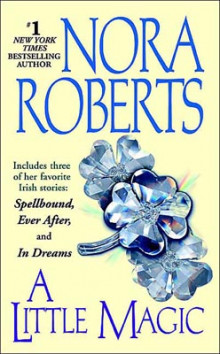 A Little Magic
A Little Magic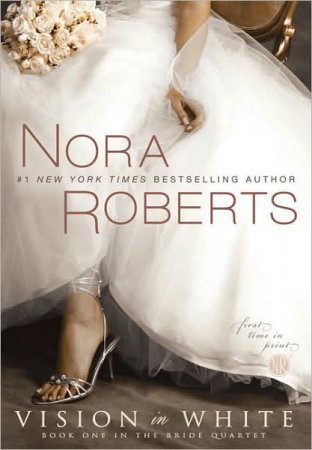 Vision in White
Vision in White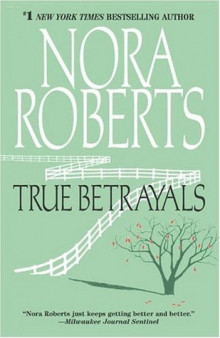 True Betrayals
True Betrayals The Next Always
The Next Always A Man for Amanda
A Man for Amanda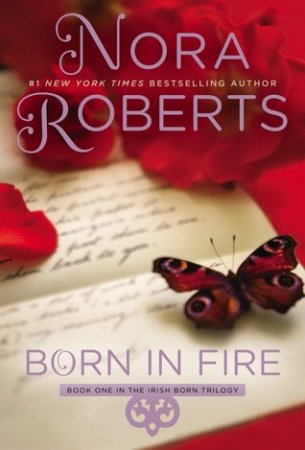 Born in Fire
Born in Fire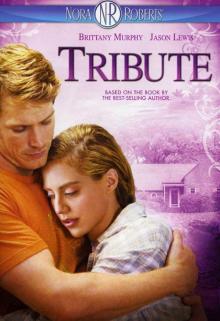 Tribute
Tribute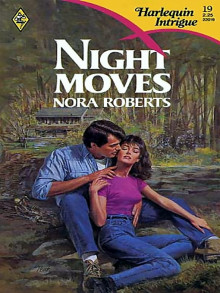 Night Moves
Night Moves Dance Upon the Air
Dance Upon the Air The Name of the Game
The Name of the Game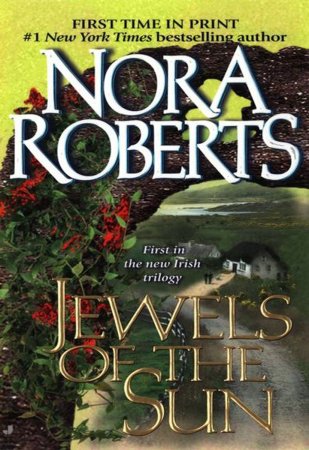 Jewels of the Sun
Jewels of the Sun River's End
River's End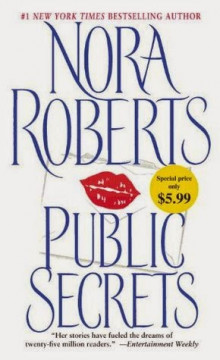 Public Secrets
Public Secrets Homeport
Homeport Private Scandals
Private Scandals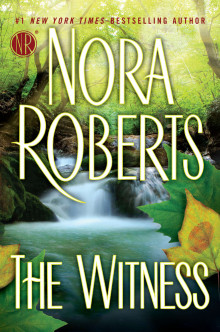 The Witness
The Witness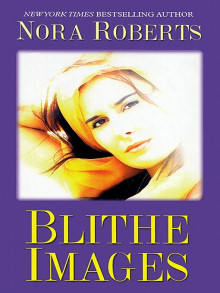 Blithe Images
Blithe Images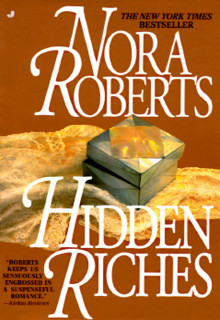 Hidden Riches
Hidden Riches Key of Light
Key of Light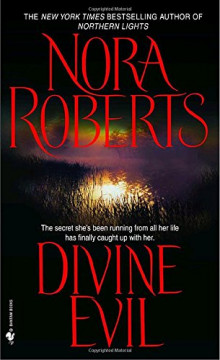 Divine Evil
Divine Evil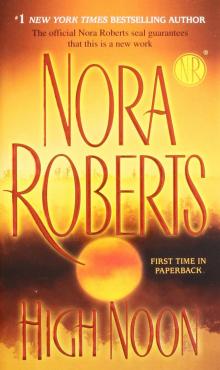 High Noon
High Noon Blue Dahlia
Blue Dahlia Sea Swept
Sea Swept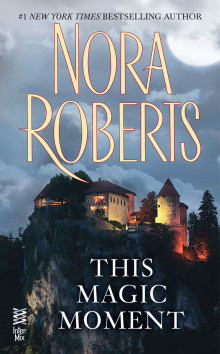 This Magic Moment
This Magic Moment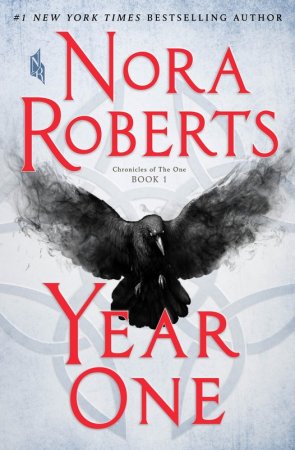 Year One
Year One A Little Fate
A Little Fate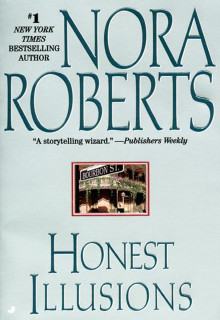 Honest Illusions
Honest Illusions The Reef
The Reef Shelter in Place
Shelter in Place The Hollow
The Hollow Holding the Dream
Holding the Dream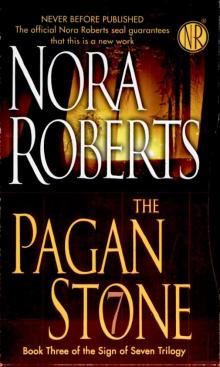 The Pagan Stone
The Pagan Stone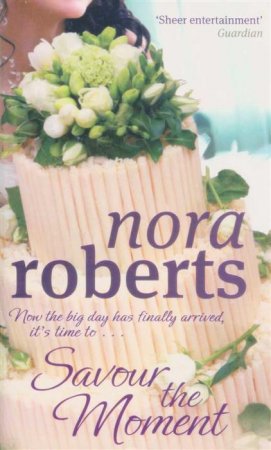 Savour the Moment
Savour the Moment The Perfect Hope
The Perfect Hope Island of Glass
Island of Glass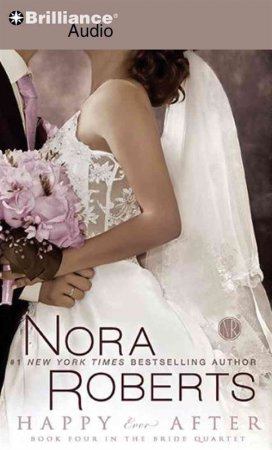 Happy Ever After
Happy Ever After Bed of Roses
Bed of Roses Stars of Fortune
Stars of Fortune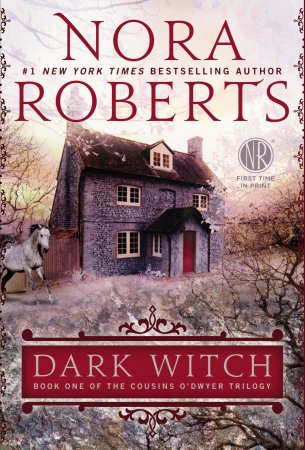 Dark Witch
Dark Witch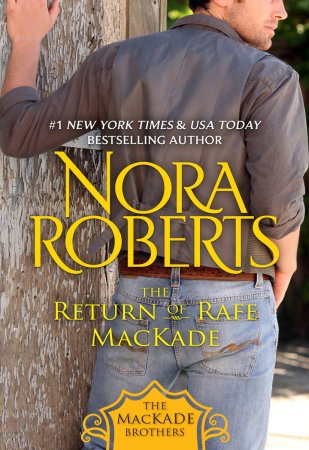 The Return of Rafe MacKade
The Return of Rafe MacKade Chesapeake Blue
Chesapeake Blue The Perfect Neighbor
The Perfect Neighbor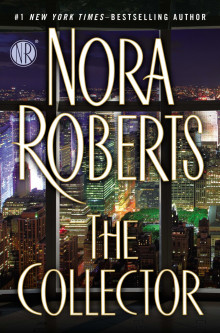 The Collector
The Collector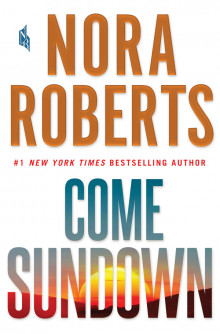 Come Sundown
Come Sundown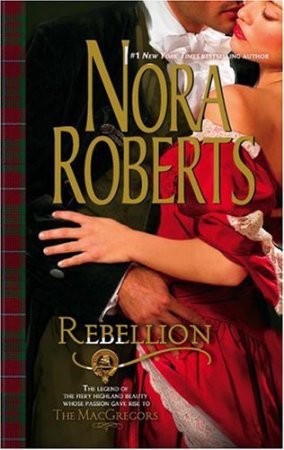 Rebellion
Rebellion Affaire Royale
Affaire Royale Daring to Dream
Daring to Dream Bay of Sighs
Bay of Sighs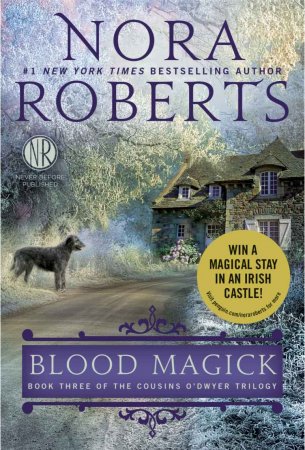 Blood Magick
Blood Magick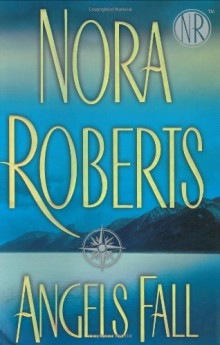 Angels Fall
Angels Fall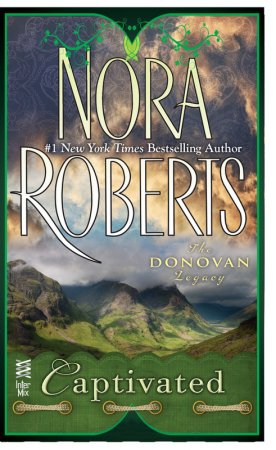 Captivated
Captivated The Last Boyfriend
The Last Boyfriend Irish Thoroughbred
Irish Thoroughbred Inner Harbor
Inner Harbor The Right Path
The Right Path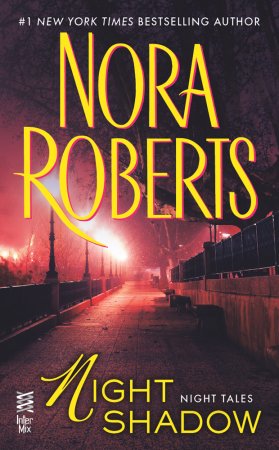 Night Shadow
Night Shadow The Heart of Devin MacKade
The Heart of Devin MacKade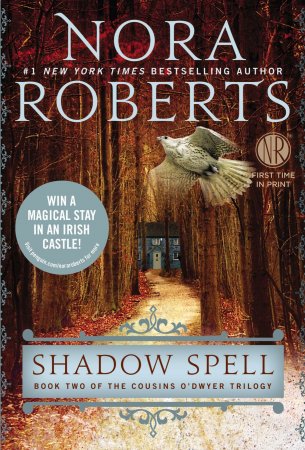 Shadow Spell
Shadow Spell The Playboy Prince
The Playboy Prince The Fall of Shane MacKade
The Fall of Shane MacKade Rising Tides
Rising Tides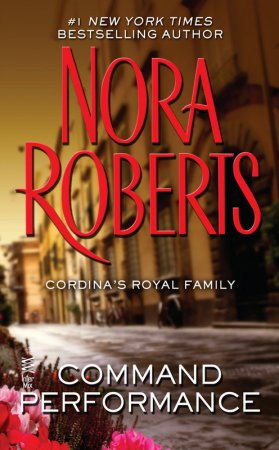 Command Performance
Command Performance Hidden Star
Hidden Star Cordina's Crown Jewel
Cordina's Crown Jewel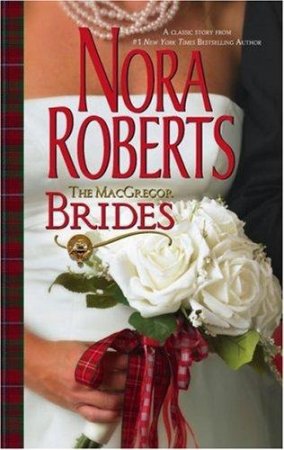 The MacGregor Brides
The MacGregor Brides The Pride of Jared MacKade
The Pride of Jared MacKade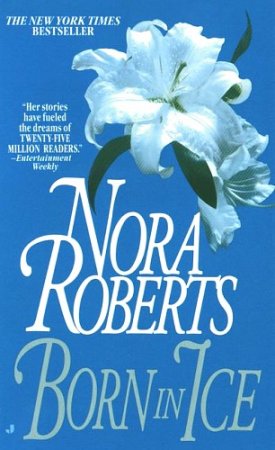 Born in Ice
Born in Ice Whiskey Beach
Whiskey Beach The Last Honest Woman
The Last Honest Woman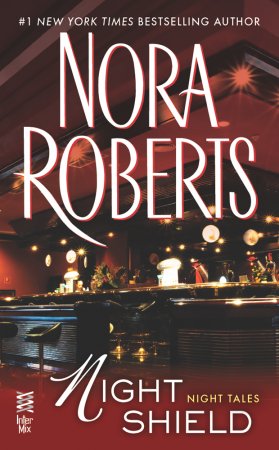 Night Shield
Night Shield Born in Shame
Born in Shame Secret Star
Secret Star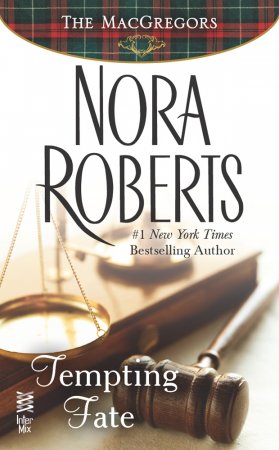 Tempting Fate
Tempting Fate Nightshade
Nightshade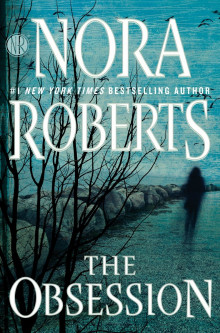 The Obsession
The Obsession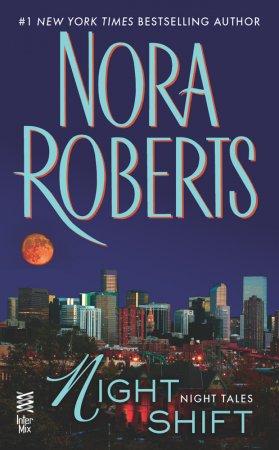 Night Shift
Night Shift Playing The Odds
Playing The Odds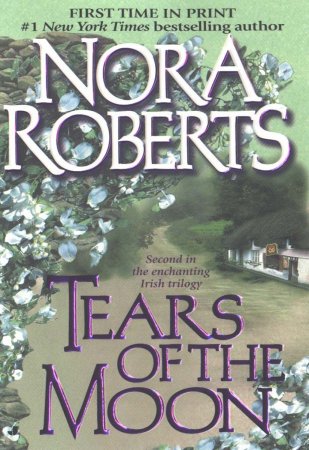 Tears of the Moon
Tears of the Moon One Man's Art
One Man's Art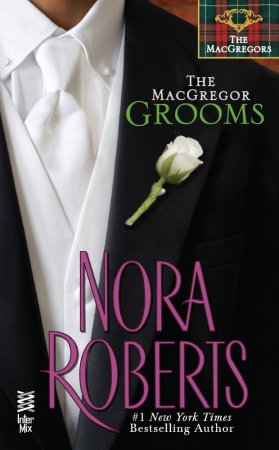 The MacGregor Groom
The MacGregor Groom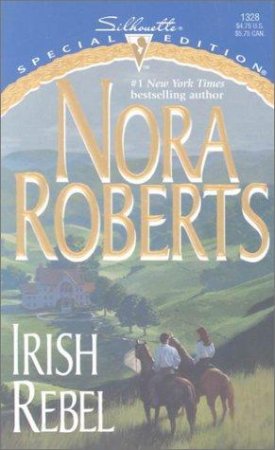 Irish Rebel
Irish Rebel Morrigan's Cross
Morrigan's Cross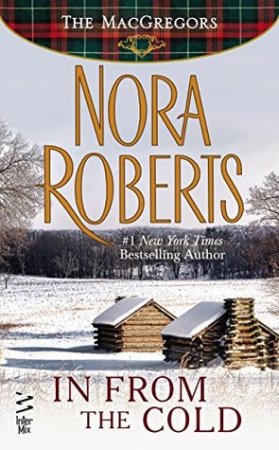 In From The Cold
In From The Cold Night Smoke
Night Smoke Finding the Dream
Finding the Dream Red Lily
Red Lily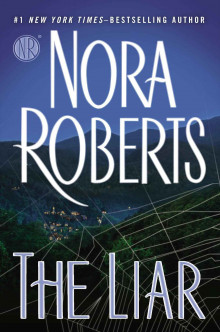 The Liar
The Liar Montana Sky
Montana Sky Heart of the Sea
Heart of the Sea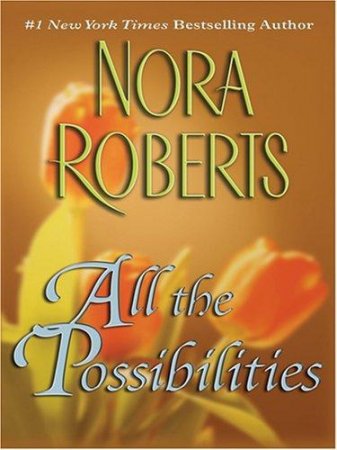 All The Possibilities
All The Possibilities Opposites Attract
Opposites Attract Captive Star
Captive Star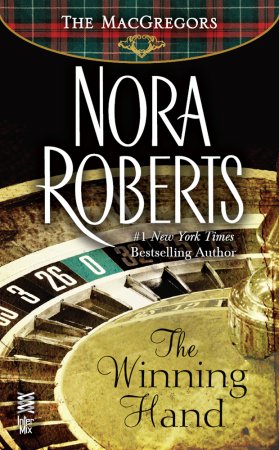 The Winning Hand
The Winning Hand Key of Valor
Key of Valor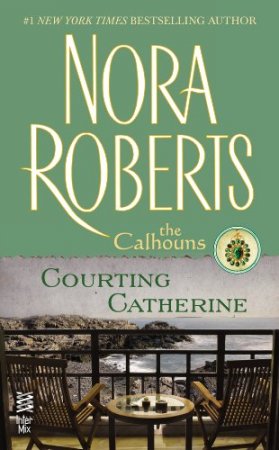 Courting Catherine
Courting Catherine Heaven and Earth
Heaven and Earth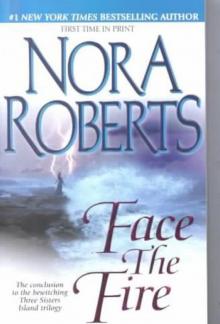 Face the Fire
Face the Fire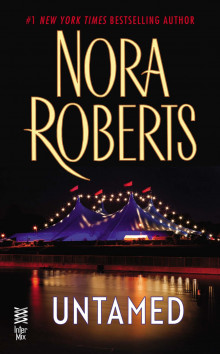 Untamed
Untamed Skin Deep
Skin Deep Enchanted
Enchanted Song of the West
Song of the West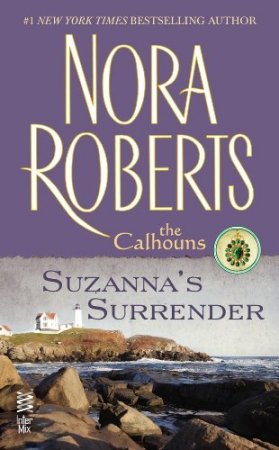 Suzanna's Surrender
Suzanna's Surrender Entranced
Entranced Dance of the Gods
Dance of the Gods Key of Knowledge
Key of Knowledge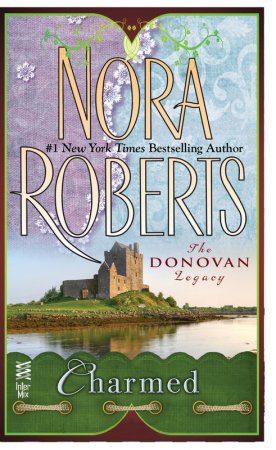 Charmed
Charmed For Now, Forever
For Now, Forever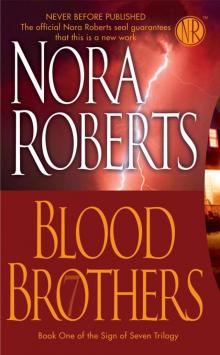 Blood Brothers
Blood Brothers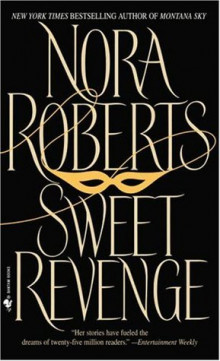 Sweet Revenge
Sweet Revenge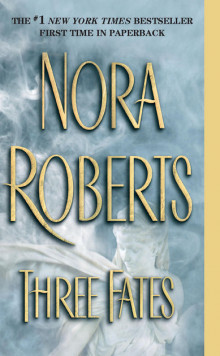 Three Fates
Three Fates Mind Over Matter
Mind Over Matter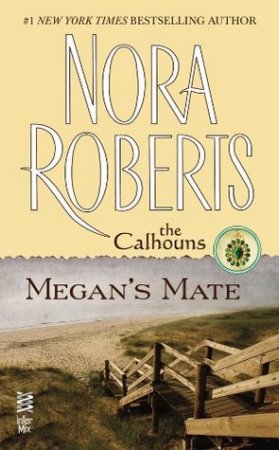 Megan's Mate
Megan's Mate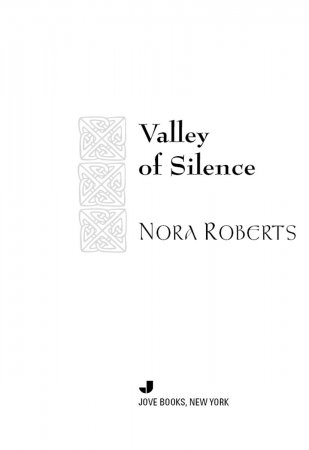 Valley of Silence
Valley of Silence Without A Trace
Without A Trace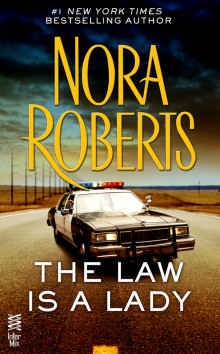 The Law is a Lady
The Law is a Lady Temptation
Temptation Dance to the Piper
Dance to the Piper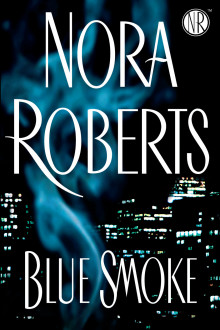 Blue Smoke
Blue Smoke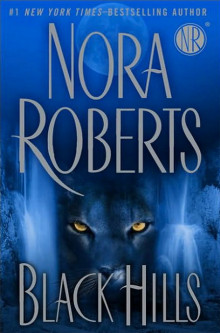 Black Hills
Black Hills The Heart's Victory
The Heart's Victory Sullivan's Woman
Sullivan's Woman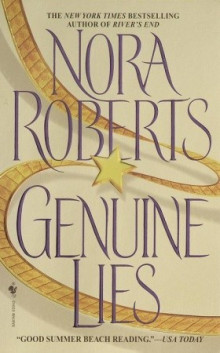 Genuine Lies
Genuine Lies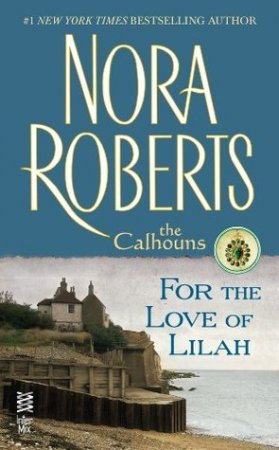 For the Love of Lilah
For the Love of Lilah Gabriel's Angel
Gabriel's Angel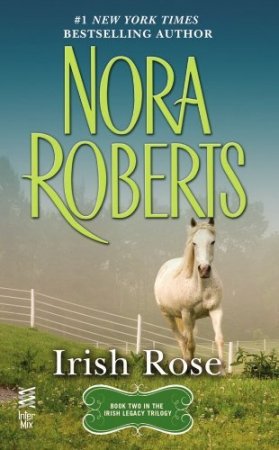 Irish Rose
Irish Rose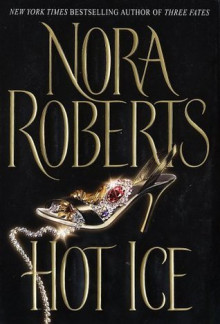 Hot Ice
Hot Ice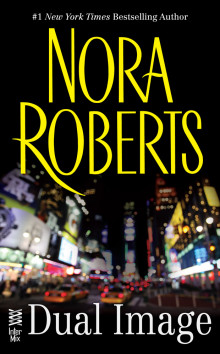 Dual Image
Dual Image Lawless
Lawless Catch My Heart
Catch My Heart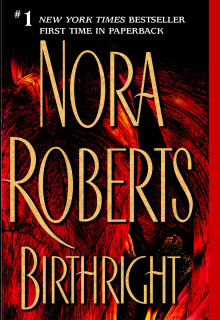 Birthright
Birthright First Impressions
First Impressions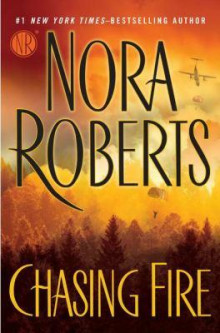 Chasing Fire
Chasing Fire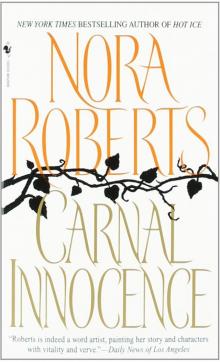 Carnal Innocence
Carnal Innocence Best Laid Plans
Best Laid Plans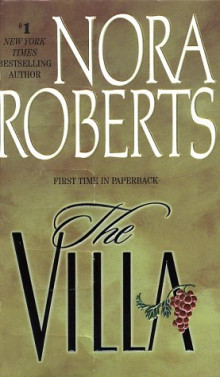 The Villa
The Villa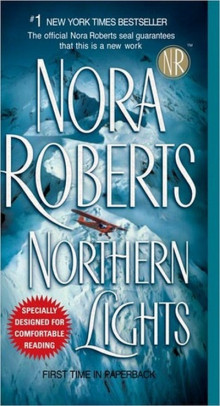 Northern Lights
Northern Lights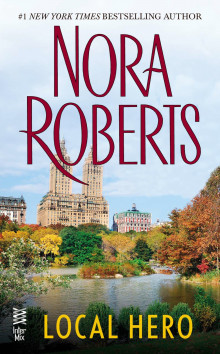 Local Hero
Local Hero Island of Flowers
Island of Flowers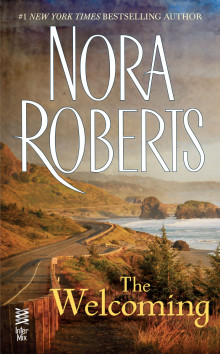 The Welcoming
The Welcoming All I Want for Christmas
All I Want for Christmas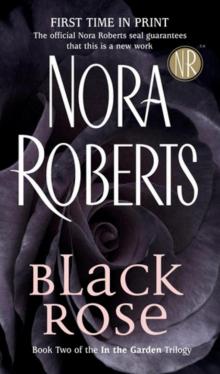 Black Rose
Black Rose Hot Rocks
Hot Rocks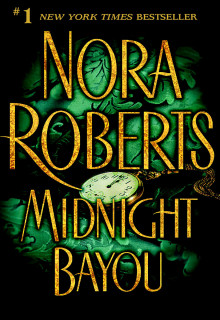 Midnight Bayou
Midnight Bayou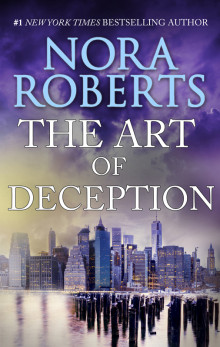 The Art of Deception
The Art of Deception From This Day
From This Day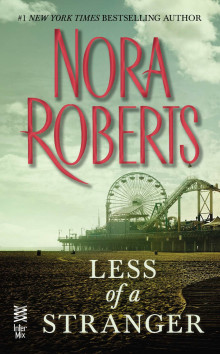 Less of a Stranger
Less of a Stranger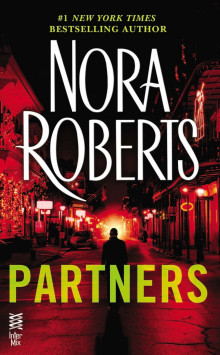 Partners
Partners Storm Warning
Storm Warning Once More With Feeling
Once More With Feeling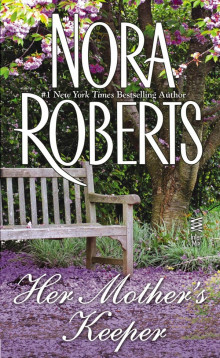 Her Mother's Keeper
Her Mother's Keeper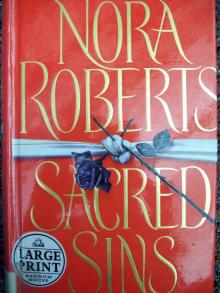 Sacred Sins
Sacred Sins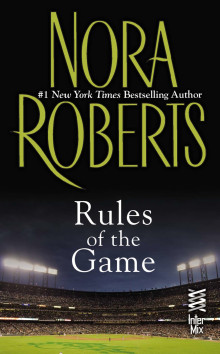 Rules of the Game
Rules of the Game Sanctuary
Sanctuary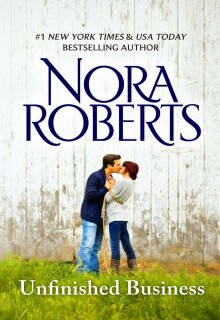 Unfinished Business
Unfinished Business Cordina's Royal Family Collection
Cordina's Royal Family Collection Dangerous Embrace
Dangerous Embrace One Summer
One Summer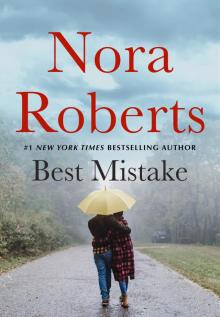 The Best Mistake
The Best Mistake Boundary Lines
Boundary Lines Under Currents
Under Currents The Stanislaski Series Collection, Volume 1
The Stanislaski Series Collection, Volume 1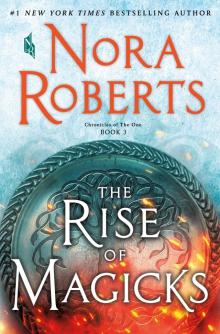 The Rise of Magicks
The Rise of Magicks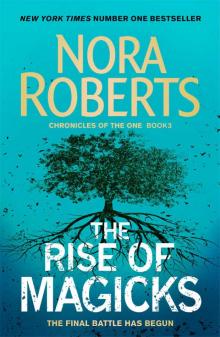 The Rise of Magicks (Chronicles of The One)
The Rise of Magicks (Chronicles of The One) The Awakening: The Dragon Heart Legacy Book 1
The Awakening: The Dragon Heart Legacy Book 1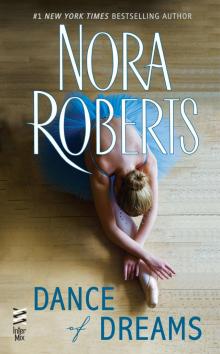 Dance of Dreams
Dance of Dreams Skin Deep: The O'Hurleys
Skin Deep: The O'Hurleys The Quinn Legacy: Inner Harbor ; Chesapeake Blue
The Quinn Legacy: Inner Harbor ; Chesapeake Blue![[Chronicles of the One 03.0] The Rise of Magicks Read online](http://i1.bookreadfree.com/11/chronicles_of_the_one_03_0_the_rise_of_magicks_preview.jpg) [Chronicles of the One 03.0] The Rise of Magicks
[Chronicles of the One 03.0] The Rise of Magicks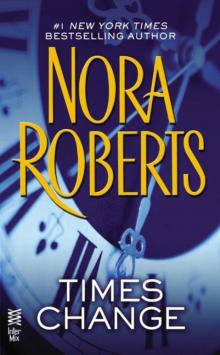 Times Change
Times Change Dance to the Piper: The O'Hurleys
Dance to the Piper: The O'Hurleys Christmas In the Snow: Taming Natasha / Considering Kate
Christmas In the Snow: Taming Natasha / Considering Kate Waiting for Nick
Waiting for Nick Summer Desserts
Summer Desserts Dream 2 - Holding the Dream
Dream 2 - Holding the Dream The Novels of Nora Roberts, Volume 2
The Novels of Nora Roberts, Volume 2 In the Garden Trilogy
In the Garden Trilogy Eight Classic Nora Roberts Romantic Suspense Novels
Eight Classic Nora Roberts Romantic Suspense Novels Best Laid Plans jh-2
Best Laid Plans jh-2 From the Heart
From the Heart Holiday Wishes
Holiday Wishes Dream 1 - Daring to Dream
Dream 1 - Daring to Dream Second Nature
Second Nature Summer Pleasures
Summer Pleasures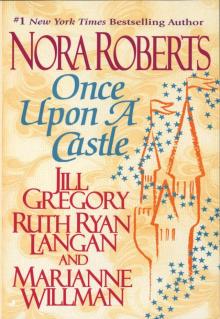 Once Upon a Castle
Once Upon a Castle Stars of Mithra Box Set: Captive StarHidden StarSecret Star
Stars of Mithra Box Set: Captive StarHidden StarSecret Star Impulse
Impulse The Irish Trilogy by Nora Roberts
The Irish Trilogy by Nora Roberts The Pride Of Jared Mackade tmb-2
The Pride Of Jared Mackade tmb-2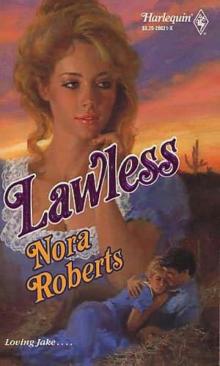 Lawless jh-3
Lawless jh-3 Taming Natasha
Taming Natasha Endless Summer
Endless Summer Bride Quartet Collection
Bride Quartet Collection Happy Ever After tbq-4
Happy Ever After tbq-4 Heart Of The Sea goa-3
Heart Of The Sea goa-3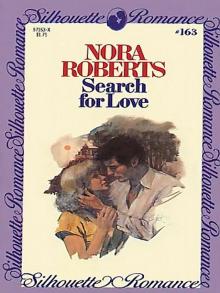 Search for Love
Search for Love Once upon a Dream
Once upon a Dream Once Upon a Star
Once Upon a Star Dream Trilogy
Dream Trilogy Risky Business
Risky Business The Novels of Nora Roberts, Volume 3
The Novels of Nora Roberts, Volume 3 Dream 3 - Finding the Dream
Dream 3 - Finding the Dream Promises in Death id-34
Promises in Death id-34 The Novels of Nora Roberts, Volume 4
The Novels of Nora Roberts, Volume 4 The Perfect Hope ib-3
The Perfect Hope ib-3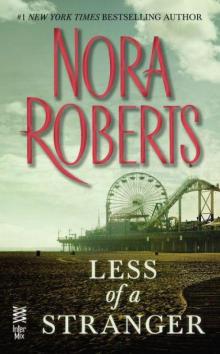 Less than a Stranger
Less than a Stranger Savour the Moment: Now the Big Day Has Finally Arrived, It's Time To...
Savour the Moment: Now the Big Day Has Finally Arrived, It's Time To... Convincing Alex
Convincing Alex Bed of Roses tbq-2
Bed of Roses tbq-2 Savour the Moment tbq-3
Savour the Moment tbq-3 Lessons Learned
Lessons Learned Key Of Valor k-3
Key Of Valor k-3 Red lily gt-3
Red lily gt-3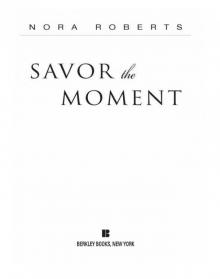 Savor the Moment
Savor the Moment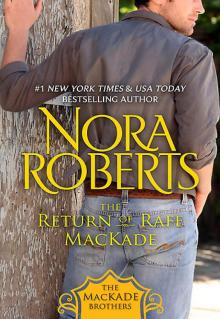 The Return Of Rafe Mackade tmb-1
The Return Of Rafe Mackade tmb-1 For The Love Of Lilah tcw-3
For The Love Of Lilah tcw-3 Black Rose gt-2
Black Rose gt-2 Novels: The Law is a Lady
Novels: The Law is a Lady Chesapeake Bay Saga 1-4
Chesapeake Bay Saga 1-4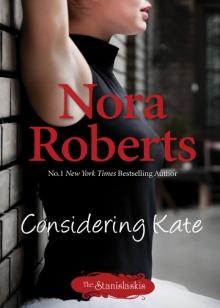 Considering Kate
Considering Kate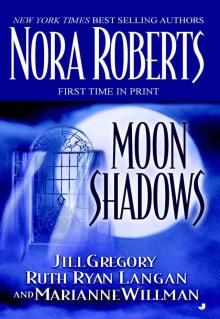 Moon Shadows
Moon Shadows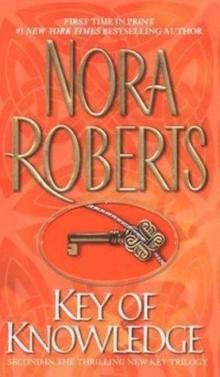 Key of Knowledge k-2
Key of Knowledge k-2 The Sign of Seven Trilogy
The Sign of Seven Trilogy Once Upon a Kiss
Once Upon a Kiss The Novels of Nora Roberts, Volume 5
The Novels of Nora Roberts, Volume 5 Suzanna's Surrender tcw-4
Suzanna's Surrender tcw-4 The Quinn Brothers
The Quinn Brothers Falling for Rachel
Falling for Rachel Brazen Virtue
Brazen Virtue Time Was
Time Was The Gallaghers of Ardmore Trilogy
The Gallaghers of Ardmore Trilogy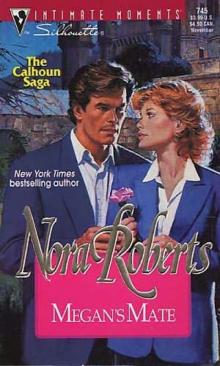 Megan's Mate tcw-5
Megan's Mate tcw-5 Loving Jack jh-1
Loving Jack jh-1 Rebellion & In From The Cold
Rebellion & In From The Cold Blue Dahlia gt-1
Blue Dahlia gt-1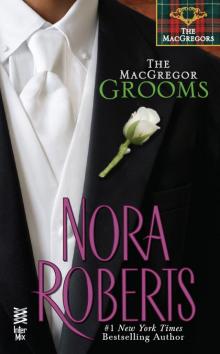 The MacGregor Grooms
The MacGregor Grooms The Next Always tibt-1
The Next Always tibt-1 The Heart Of Devin Mackade tmb-3
The Heart Of Devin Mackade tmb-3 The Novels of Nora Roberts Volume 1
The Novels of Nora Roberts Volume 1 Treasures Lost, Treasures Found
Treasures Lost, Treasures Found Nora Roberts's Circle Trilogy
Nora Roberts's Circle Trilogy The Key Trilogy
The Key Trilogy The Fall Of Shane Mackade tmb-4
The Fall Of Shane Mackade tmb-4 A Will And A Way
A Will And A Way Jewels of the Sun goa-1
Jewels of the Sun goa-1 Luring a Lady
Luring a Lady